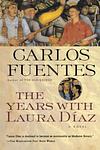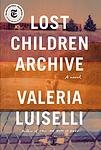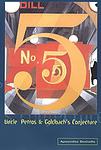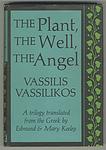The Greatest Greek, Mexican "Fiction" Books Since 1900
Click to learn how this list is calculated.
This list represents a comprehensive and trusted collection of the greatest books. Developed through a specialized algorithm, it brings together 300 'best of' book lists to form a definitive guide to the world's most acclaimed books. For those interested in how these books are chosen, additional details can be found on the rankings page.
Genres
Countries
Date Range
Reading Statistics
Click the button below to see how many of these books you've read!
Download
If you're interested in downloading this list as a CSV file for use in a spreadsheet application, you can easily do so by clicking the button below. Please note that to ensure a manageable file size and faster download, the CSV will include details for only the first 500 books.
Download-
1. Pedro Páramo by Juan Rulfo
This novel transports readers to the ghost town of Comala, where the protagonist, Juan Preciado, ventures in search of his estranged father, Pedro Páramo. Upon arrival, he encounters a realm where the living and the dead coexist, and through fragmented narratives and spectral encounters, the story of Pedro Páramo's life, his love, tyranny, and the curses that plague the town unfolds. The novel's innovative structure, blending memory and reality, has cemented its status as a pioneering work of magical realism, offering a haunting exploration of power, guilt, and the inescapable echoes of the past.
-
2. Zorba the Greek by Nikos Kazantzakis
In this novel, a young intellectual who is immersed in books and ideas embarks on a journey with a passionate and adventurous older man named Zorba. The two men have contrasting personalities, which leads to a series of philosophical discussions and adventures. The story is set in Crete and explores themes of life, death, friendship, love, and the struggle between the physical and intellectual aspects of existence. Zorba's zest for life and his fearlessness in the face of death inspire the young man to embrace a more physical and spontaneous way of living.
-
3. Like Water For Chocolate by Laura Esquivel
This novel is a romantic, magical realism tale set in turn-of-the-century Mexico. It chronicles the life of Tita, the youngest daughter in a traditional Mexican family, who is forbidden to marry due to a family custom that mandates the youngest daughter must care for her mother until death. Tita falls in love with Pedro, who in turn marries her elder sister to stay close to her. The story is uniquely structured around the twelve months of the year, each beginning with a traditional Mexican recipe. The protagonist's emotions become infused with her cooking, leading to strange effects on those who consume her culinary creations.
-
4. The Death of Artemio Cruz by Carlos Fuentes
The novel revolves around the life of a self-centered Mexican media mogul, Artemio Cruz, who is on his deathbed. As he reflects on his past, the narrative shifts between first, second, and third person perspectives, exploring different stages of Cruz's life from his impoverished childhood, his participation in the Mexican Revolution, his ruthless pursuit of power, and his eventual downfall. The book is a critique of the corruption and moral decay in Mexican society following the Revolution.
-
5. The Burning Plain and Other Stories by Juan Rulfo
"The Burning Plain and Other Stories" is a collection of short narratives set in the harsh rural areas of Mexico, depicting the brutal realities of peasant life. The stories are filled with characters who are haunted by their past, living in extreme poverty, and often meeting violent ends. The book is renowned for its stark, realistic portrayal of life and its exploration of the human capacity for hope and survival in the face of despair.
-
6. The Underdogs by Mariano Azuela
"The Underdogs" is a novel set during the Mexican Revolution, depicting the conflict from the perspective of the peasants who fought in it. The story follows the journey of a poor, illiterate Indian named Demetrio Macias, who becomes a reluctant leader in the rebellion against the federal government. The narrative explores the brutality and chaos of war, the corruption of power, and the often futile nature of rebellion, painting a grim picture of the human cost of revolution.
-
7. The Labyrinth of Solitude by Octavio Paz
This book is a profound and vivid exploration of Mexico's character, culture, and identity. The author delves into Mexico's history, politics, and psyche, examining the country's deep solitude and its impact on the national character. The book provides a comprehensive analysis of Mexican society, its myths, symbols, and rituals, offering a deep understanding of the Mexican people's unique way of perceiving the world. It also discusses the influence of the United States on Mexico and the complex relationship between the two countries.
-
8. The Last Temptation of Christ by Nikos Kazantzakis
This novel presents an alternative interpretation of the life of Jesus Christ, who is depicted as a conflicted, all-too-human figure who struggles with his divine destiny. The book explores his journey through life, his friendships, his fears, and his ultimate temptation to avoid crucifixion and live a normal life. The narrative delves into the psychological and emotional aspects of his experiences, creating a complex, humanized portrayal of a traditionally divine figure.
-
9. Z by Vassilis Vassilikos
"Z" is a political novel that explores the events surrounding the assassination of a prominent leftist politician in Greece. The story delves into the corruption and violence that pervades the government, with the narrative alternating between the perspectives of the victim, the assassins, the investigators, and the government officials involved. The novel is a critique of political tyranny and an exploration of the struggle for justice in a corrupt system.
-
10. Cartucho And My Mother's Hands by Nellie Campobello
"Cartucho And My Mother's Hands" is a poignant collection of vignettes that offer a child's perspective on the Mexican Revolution. Through a series of short, vivid sketches, the narrative captures the brutality and humanity of the conflict as witnessed by the young protagonist. The work is both a personal memoir and a tribute to the resilience of women, particularly the author's mother, whose strength and tenderness are symbolized by her hands. The book blends the innocence of childhood with the harsh realities of war, providing a unique and emotionally resonant account of historical events that shaped Mexico's national identity.
-
11. Here's to You, Jesusa! by Elena Poniatowska
This novel tells the story of Jesusa, a woman who experiences the Mexican Revolution, the Cristero War, and the development of the Institutional Revolutionary Party. Through her eyes, readers witness the struggles of poverty, the brutality of war, and the realities of a woman's life in early 20th century Mexico. The protagonist's life is filled with hardship, but she remains resilient, embodying the spirit of the Mexican people during a turbulent time in history.
-
12. The Third Wedding by Kōstas Tachtsēs
"The Third Wedding" is a powerful exploration of love, passion, and societal expectations set in mid-20th century Greece. The story revolves around a strong-willed and independent woman who has been married twice and is about to enter her third marriage. The narrative delves into her past love affairs, her struggle with the societal norms of the time, and her quest for personal freedom. The book is a poignant commentary on the condition of women in a patriarchal society and the sacrifices they make in the name of love and duty.
-
13. Terra Nostra by Carlos Fuentes
This sprawling, complex novel is a rich tapestry of historical, philosophical, and literary references that explores the identity and culture of Latin America through a fantastical lens. Set primarily in 16th-century Spain during the reign of Philip II, the narrative weaves together the lives of historical figures and fictional characters, blending reality with myth and time travel. The story delves into themes of creation and destruction, the cyclical nature of history, and the quest for a utopian society, all while examining the consequences of colonialism and the search for a Latin American identity that reconciles its indigenous, African, and European heritage. The novel's intricate structure and dense prose challenge the reader to consider the past's impact on the present and future of a region with a tumultuous history.
-
14. The Nine Guardians by Rosario Castellanos
"The Nine Guardians" is a poignant novel set in the 1930s in Chiapas, Mexico, during the time of agrarian reforms under President Lázaro Cárdenas. Narrated from the perspective of a young girl from a landowning family, the story explores the profound social and cultural upheavals faced by both the indigenous people and the ruling class as land is redistributed. Through her eyes, readers experience the clash of cultures and the violent struggles over land rights, witnessing the impact of political change on personal and familial relationships. The novel delves deeply into themes of power, race, and identity, providing a rich, emotional, and historically grounded narrative.
-
15. The Years with Laura Diaz by Carlos Fuentes
"The Years with Laura Diaz" is a historical novel that centers around the life of a woman named Laura Diaz, a member of the Mexican upper class. The book explores the political and social changes in Mexico throughout the 20th century, as seen through Laura's eyes. Her journey includes a loveless marriage, a passionate affair, and a career as a photographer during the Mexican Revolution. The story weaves together personal, political, and cultural threads, creating a rich tapestry of Mexican history and the indomitable spirit of its women.
-
16. City Of Kings by Rosario Castellanos
"City of Kings" is a poignant exploration of the cultural and social dynamics in a Latin American town, where the indigenous and colonial legacies collide. The narrative delves into the lives of the town's inhabitants, both the oppressed indigenous people and the ruling Spanish descendants, revealing the complexities of power, race, and identity. Through a series of interwoven stories, the novel paints a vivid picture of a society grappling with the remnants of colonialism and the struggle for modernity, exposing the deep-rooted injustices and the characters' quest for dignity and redemption amidst a changing world.
-
17. False Years by Josefina Vicens
"False Years" is a thought-provoking exploration of identity and the passage of time, following the life of a man who grapples with the authenticity of his existence. As he reflects on his past, he questions the decisions he has made and the roles he has played, which seem to him now as mere falsehoods. The narrative delves into the themes of existential angst and the search for self, as the protagonist confronts the dissonance between his inner self and the person he presents to the world. The book challenges readers to consider the masks they wear and the truths they live, making it a poignant study of the human condition.
-
18. The Daughter by Pavlos Matesis
"The Daughter" is a powerful novel set in Greece during the Second World War. The narrative follows the life of a young girl who is forced to grow up quickly due to the harsh realities of war. Her father, a communist, is executed by the Germans, and the girl is left to navigate the complexities of life, politics, and love in a world that is rapidly changing. The book offers a poignant exploration of the human capacity for resilience, survival, and hope in the face of unimaginable adversity.
-
19. Astradeni by Eugenia Fakinou
"Astradeni" is a coming-of-age novel set in post-World War II Greece. The story follows the life of a young girl named Astradeni, who is forced to grow up quickly due to the harsh realities of war and poverty. Despite the hardships she faces, Astradeni maintains a hopeful and imaginative spirit, often escaping into a world of myths and legends. The novel explores themes of resilience, the power of storytelling, and the enduring strength of the human spirit.
-
20. Lost Children Archive by Valeria Luiselli
"Lost Children Archive" by Valeria Luiselli is a novel that follows a family on a road trip from New York to Arizona. The parents are documentarians and are working on separate projects, while the children are preoccupied with their own interests. As they travel, the family becomes increasingly aware of the migrant crisis and the children's obsession with finding lost things takes on a new meaning. The novel explores themes of family, identity, and the power of storytelling.
-
21. Uncle Petros and Goldbach's Conjecture by Apostolos Doxiadis
The novel follows the story of a young man who becomes fascinated by his reclusive and eccentric Uncle Petros. As he delves into his uncle's past, he uncovers Petros' obsession with proving Goldbach's Conjecture, a famous unsolved problem in number theory. This obsession led to Petros' alienation from society and ultimately his downfall. The book explores themes of mathematical obsession, family relationships, and the fine line between genius and madness.
-
22. Difficult Nights by Melpo Axioti
This book is a poignant exploration of human emotions and experiences, delving into the depths of despair, love, and the quest for meaning in a tumultuous world. Through a series of interconnected stories, the narrative weaves together the lives of various characters, each struggling with their own inner turmoil and societal constraints. Set against the backdrop of early 20th-century Europe, the book captures the essence of the human condition, portraying the complex interplay between personal desires and the harsh realities of life. With its rich, lyrical prose, the novel invites readers to reflect on the nature of difficulty, the nights of the soul we all must navigate, and the glimmers of hope that sustain us through our darkest hours.
-
23. The Story Of Andreas Kordopatis by Thanassis Valtinos
This novel unfolds the life journey of Andreas Kordopatis, tracing his odyssey from his origins in the Peloponnese, through his ventures in the United States and his return to Greece. Set against the backdrop of the late 19th and early 20th centuries, the narrative weaves through the personal and historical, exploring themes of migration, identity, and the pursuit of a better life. Through a blend of personal accounts, letters, and third-person narration, the reader is immersed in the struggles and aspirations of a man navigating the complexities of diaspora and the relentless quest for home and belonging amidst the turbulent tides of history.
-
24. The Plant, The Well, The Angel by Vassilis Vassilikos
This novel weaves a complex narrative that explores the interconnectedness of human life, nature, and the divine. Through the symbolic elements of a plant, a well, and an angel, the story delves into themes of growth, discovery, and spiritual awakening. Set against a backdrop that blends the mundane with the mystical, the narrative follows the journey of its characters as they navigate personal and collective challenges, ultimately seeking redemption and enlightenment. The author masterfully uses these symbols to reflect on the essence of existence, the cycles of life, and the pursuit of meaning in a world filled with both beauty and hardship.
-
25. Η κρύπτη by Ε.Χ. Γονατάς
The book unfolds within the mysterious and eerie confines of a crypt, where secrets from the past and present intertwine. As the protagonist delves deeper into the crypt's enigmatic depths, they encounter a series of cryptic clues and supernatural occurrences that challenge their understanding of reality. The narrative masterfully blends elements of horror, mystery, and historical fiction, leading readers on a suspenseful journey through time and darkness. The crypt, with its ancient allure and hidden dangers, becomes a character in its own right, revealing truths that are as unsettling as they are enlightening, ultimately confronting the protagonist with a revelation that could alter their perception of life and death.
Reading Statistics
Click the button below to see how many of these books you've read!
Download
If you're interested in downloading this list as a CSV file for use in a spreadsheet application, you can easily do so by clicking the button below. Please note that to ensure a manageable file size and faster download, the CSV will include details for only the first 500 books.
Download

















